

(14) CTB V News Group Newspapers Limited and Imogen Thomas. Privacy Law: An Overview – Zvulony & Co. By Shaya Silber As we move into an age where growing portions of our lives are becoming digitized, many holes are becoming apparent in these new information systems.
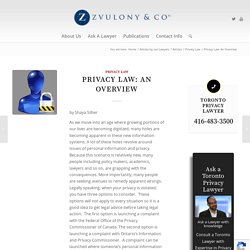
A lot of these holes revolve around issues of personal information and privacy. Because this scenario is relatively new, many people including policy makers, academics, lawyers and so on, are grappling with the consequences. More importantly, many people are seeking avenues to remedy apparent wrongs. Legally speaking, when your privacy is violated, you have three options to consider. 1.
Home - Canada's Anti-Spam Legislation. An Act to promote the efficiency and adaptability of the Canadian economy by regulating certain activities that discourage reliance on electronic means of carrying out commercial activities, and to amend the Canadian Radio-television and Telecommunication. IPC - Information and Privacy Commissioner of Ontario.
Office of the Privacy Commissioner of Canada. Summary of privacy laws in Canada. This page is not intended to provide legal advice; it is only intended to provide general information about privacy legislation in Canada.
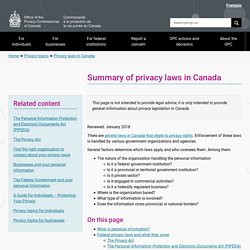
Reviewed: January 2018 There are several laws in Canada that relate to privacy rights. Enforcement of these laws is handled by various government organizations and agencies. Several factors determine which laws apply and who oversees them. Among them: The nature of the organization handling the personal information Is it a federal government institution? Canadians Are Worried About NSA Spying But Don’t Understand How It Happens. Feds made 5,670 privacy breaches last year; CRA worst offender.
New documents show that the private information of tens of thousands of people was mishandled by the federal government last year, including hundreds of taxpayer files inappropriately accessed by employees of the Canada Revenue Agency, which was the worst offender.
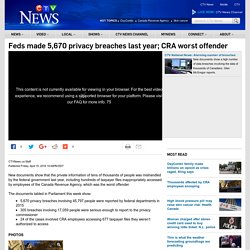
The documents tabled in Parliament this week show: Thousands affected by CRA employees snooping. CTVNews.ca Staff, with a report from Annie Bergeron-Oliver Published Friday, February 1, 2019 10:02PM EST The information of thousands of Canadians has been accessed inappropriately by Canada Revenue Agency employees, CTV News has learned.
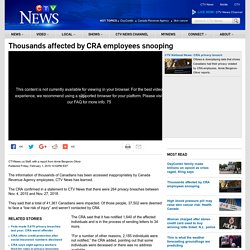
The CRA confirmed in a statement to CTV News that there were 264 privacy breaches between Nov. 4, 2015 and Nov. 27, 2018. They said that a total of 41,361 Canadians were impacted. Toronto man raises privacy concerns after car dealership employee turns off his dashcams — twice. A Toronto man is warning others to safeguard their privacy after his dashboard video cameras were turned off twice while work at a dealership was being done on his vehicle.

Haider Firas, 24, took his car to Parkview BMW in November. One camera in the car points out to capture video of other vehicles, and another points inside his car to protect his property. The dealership's mechanic was captured on video noticing the cameras and turning them both off. "Well that kind of raises a flag," Firas told CBC Toronto. Internet users' privacy upheld by Canada's top court. Canadians have the right to be anonymous on the internet, and police must obtain a warrant to uncover their identities, Canada's top court has ruled.
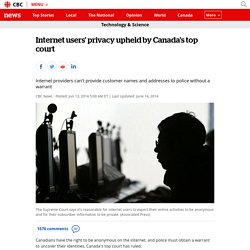
The landmark decision from the Supreme Court Friday bars internet service providers from disclosing the names, addresses and phone numbers of their customers to law enforcement officials voluntarily in response to a simple request — something ISPs have been doing hundreds of thousands of times a year. Read the Supreme Court's reasons for internet privacy decision It also means parts of the cyberbullying and digital privacy bills that are currently before the House of Commons may be unconstitutional.
Malte Spitz: Your phone company is watching. Alessandro Acquisti: What will a future without secrets look like? We Want to Know: What Are Your Concerns About Privacy in Canada? These are worrying times for privacy in Canada.
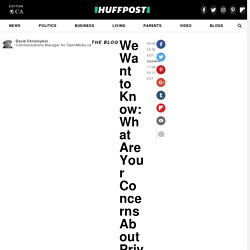
We've seen shocking revelations in recent months about the ways secretive Canadian government spy agencies like CSEC may be monitoring the everyday Internet usage of law-abiding Canadians -- and storing your private information in giant, unsecured databases. Just last week, a report by CSEC's own government-appointed watchdog concluded that CSEC may have illegally targeted Canadians within the past 12 months. Even the government's own Privacy Commissioner's office says it wants to "find out more" and is now conducting its own investigation.
And that's not all. We've also seen reports that the government is considering resurrecting elements of their failed spying Bill C-30 -- a Bill that would have allowed unaccountable bureaucrats to invade your privacy, spy on your online activity, and access your private information at any time without a warrant. Thanks a lot! Photo gallery 15 Countries With The Greatest Access To Broadband.
Photographing and filming police officers in Canada. The Ottawa Citizen has a very good editorial on the practice of police intimidation of citizens who use their cellphone cameras and other devices to record the police.
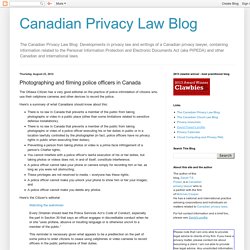
Watching the watchmenEvery Ontarian should read the Police Services Act’s Code of Conduct, especially the part in Section 30 that says an officer engages in discreditable conduct when he or she “uses profane, abusive or insulting language or is otherwise uncivil to a member of the public.” Canadian Privacy Law Blog.
Privacy: Markkula Aggregate. Mark Zuckerberg tapes up his webcam. Today, as Instagram celebrated reaching 500 million monthly users, Mark Zuckerberg posted a photo of himself enjoying the moment.

But after he did, some sharp observers noticed another detail: the laptop on his desk, which seems to have a webcam wrapped up with tape. Zuckerberg is apparently paranoid enough about hackers that he took the extra security step, in a move to shut down any prying eyes savvy enough to gain control of the camera.
OEC - Online Resources Dealing with Electronic Privacy. Privacy by Design. A panel discussion with Ben Adida, director of identity, MozillaBrian Kennish, co-founder, DisconnectArvind Narayanan, assistant professor of computer science, PrincetonIrina Raicu, Internet ethics program manager, Markkula Center for Applied Ethics Speaker bios Ben Adida is director of identity at Mozilla.

His focus is on autonomy: empowering individuals with secure, private, and efficient access to their data. Adida has applied these principles to secure voting, personal health records, and the broader Web. Brian Kennish is the cofounder of Disconnect—a Palo Alto based startup that makes tools designed to help users understand and control the data they share on the web. Arvind Narayanan is an assistant professor in computer science at Princeton. This panel, part of the "IT, Ethics, and Law" lecture series co-sponsored by the Ethics Center and the High Tech Law Institute, was held January 23, 2013. ID Cards: Links.